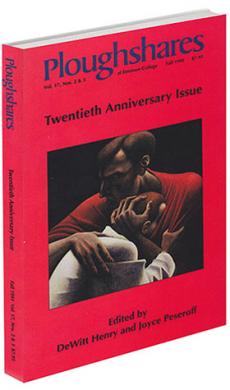rev. of The Gathering of My Name by Cornelius Eady
Beginning with "Gratitude" and ending with "The Sheets of Sound," two long poems which together describe the influences on Cornelius Eady's art of "pushing / Any damn wall" and "sailing / Right over //The top,"
The Gathering of My Name reveals a writer of sly confidence and generous authority. Good-humored enough in "Atomic Prayer" to ask, "If the bomb drops / . . . / Give us to the pleasure / of misdemeanors," Eady exults in a job that comes "As simple to me / as breathing? (secret few poets would either claim or reveal) and which entails, in "Gratitute," "the pure celebration / (And shock) / of my face / defying / its gravit."
When two drunks insult the black speaker's white wife in "Song," Eady has the equanimity to write, "
Nigger-lover is a song." But the repetition of "We / Almost made it," "Almost, / Almost, almost got out" of Virginia. ". . . almost / Didn't have / To hear it," adds menace to the praise of soft nights and plump laughter. Eady appreciates the irony of a country bluesman stranded in a "suburban home / Without a guitar or slide," but then "The old man's mask shifts its weight / Beneath your cheeks," and ruin seeps into the possible future of everyone listening to "Eddie Son House's Death Letter Blues." Poems begin with the honey of celebration and end in a sting of recognition; Eady's skill in balancing both emotions generates great poignancy.
The Gathering of My Name vibrates with the idioms of jazz and blues artists like Muddy Waters, John Coltrane, and Thelonius Monk; there are tributes to Leadbelly, the Supremes, and even to "Young Elvis" (". . . a voice as tough as a Negro's / But not a Negro's," his future manager dreams). While Allen Ginsberg and Jack Kerouac loved the funk of jazz, Eady-like Langston Hughes, and Michael S. Harper in
Dear John, Dear Coltrane — pursues the elegance of the jazz line. Witness the diction of "Alabama, c. 1963: A Ballad by John Coltrane": "But / Shouldn't this state / Have a song? / And shall we call it /
My face will murder me?" The other prong to Eady's tuning fork is the poetry of William Carlos Williams. "Gratitude" demonstrates, as few recent poems have, the versatility of Williams's three-line stanza, its opportunities for symmetry and enjambment. Eady also shares Williams's eye for the vignette, the rich implication gathered from a small scene, like the "blue car / Parked in front of a / Blue house" in "Grace." Eady, who won the Lamont Prize for his 1985 collection
Victims of the Latest Dance Craze, deserves further recognition for the wisdom and virtuosity of his latest book.


